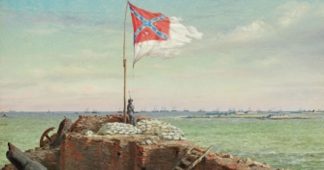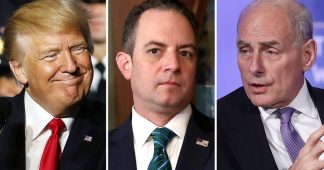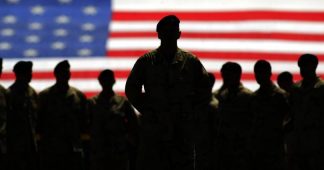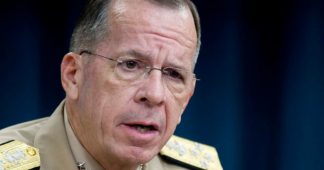John Grant
March 14, 2018
If President Trump is convicted of a crime or is impeached, will he go gracefully like the experienced politician Richard Nixon — or will he go out like Jimmy Cagney atop a giant gasoline tank in White Heat? “Top O’ the World, Ma!” Think of the institution of the presidency as that gasoline tank that goes up in a huge fireball at the end. Translated into the context of Reality TV, think of the narcissistic star-in-chief playing out the final episode under the delusion he’s still in control with his i-phone — to the bitter end stirring up a pumped and well-armed base. Sensationalistic, for sure. But implausible?
The part of this improbable administration that’s not a reality TV show centered on an infantile billionaire plutocrat is the anchor represented by Chief of Staff John Kelly — along with Defense Secretary James Mattis and Security Adviser H.R. McMaster. If this were a Herb Block cartoon from the 1970s, they’d be a very stolid rhinoceros standing in the midst of Oval Office wreckage with words on its flank that read NATIONAL SECURITY STATE.
The National Security Act of 1947 codified the reality of the imperial American military for the baby-boom generation and beyond. The War Department became the Defense Department; the CIA we know today was formed from the Office of Strategic Services. The 1947 NSA document amounted to a formal re-arrangement of the country’s priorities coming out of WWII — when the victorious United States of America became the “leader of the free world.” We forget that before World War Two changed everything, the US military was a shadow of what it was to become.
Over these 70 years, the executive in the White House has ping-ponged back-and-forth between the moderate left and the moderate right, between the Democratic and Republican Parties. (Trump may be the exception in being far right.) Every four years there‘s a national “conversation” of sorts about who’s going to live in the White House and make executive decisions and who’s going to legislate in Congress. You couldn’t come up with a better example to illustrate the idea of a civilian political see-saw than January 20, 2016, the day Barack Obama handed the civilian reins over to Donald Trump. Meanwhile, over those same 70 years, the National Security State (as an institution led by the Pentagon) has existed as a steadily ascending through-line leading to today’s post-9/11 world. Our imperial military has been, and remains, virtually untouchable through the electoral process that chooses civilian leadership. Just like assault weapons on a small scale, the National Security State thrives beyond the reach of American politics. In my mind, White House Chief of Staff and former four-star Marine General John Kelly resides in this protected zone as a power behind the civilian throne.
When Kelly was pulled from Homeland Security into the chaotic Trump White House to replace the ineffectual Reince Priebus, it was like Randolph Scott had ridden in to tame a wild-and-wooly town. Since his arrival, he’s made two things clear: one, he feels the US military is sacrosanct and beyond questioning, and two, he’s in full synch with Trump’s white supremacist instincts.
The October 19, 2017 press conference Kelly gave focused on the death of Sergeant La David Johnson in Niger was a revelatory moment. Kelly — who lost his oldest son Robert to a landmine in Afghanistan and has a second son now deployed with the Marines — opened his heart before the press corps. What he revealed was dark.
The issue was President Trump’s phone call to Johnson’s widow, who was on a cell phone in a car with family and friends, including old friend Congresswoman Frederica Wilson who was later critical of the president for what the widow felt was insensitivity. The call was on speakerphone in the car. During the press conference, Kelly detailed the steps a fallen soldier’s body goes through from battlefield to burial. He then spun off into elegy over the decline of a sense of sacredness for our military in American life. In this mood, he trashed Rep. Wilson and spread falsehoods about her speech dedicating an FBI building in her district. He called her “an empty barrel” — ie. when you beat on a barrel it’s loudest when empty. He ended the meeting by only accepting questions from reporters who (claimed) they knew a fallen hero or a gold star relative.
There are other indications of his power within the White House, such as when a Fox News reporter asked him something about policy and he replied this way: “Imade the decision to do such-and-such . . .” He pauses and continues: “. . . the president made the decision to do such-and such . . . “ The ex-Nixon dirty trickster Roger Stone, who Kelly blocked from Trump access, is cited in Michael Wolff’s Fire and Fury: Inside the Trump White House as telling people, “Mattis, McMaster and Kelly had agreed that no military action would ever be taken unless the three were in accord — and that at least one of them would always remain in Washington if the others were away.” The New York Times reports that Kelly vetoed a military style “red team, blue team” debate over climate change that was supported by Trump. The purpose of such a public debate was to raise doubt and uncertainty about climate change, thus further muddying the waters around a scientific fact. While it’s a political football among civilians like EPA Director Scott Pruitt, at the Pentagon climate change is not denied. If humans are wreaking havoc on Mother Earth, it will contribute to destabilization, making it a National Security State problem. Denying climate change to liberate industry for reasons of profit is to ignore a national security issues.
Masha Gessen wrote about this press conference in The New Yorker in a piece titled “John Kelly and the Language of the Military Coup.” It put the word coup into the discussion over the Trump White House. Gessen’s point is, “The [October 19th] press briefing could serve as a preview of what a military coup in this country would look like.” She lists four “arguments” in support of her charge concerning the press conference:
1) “Those who criticize the President don’t know what they’re talking about because they haven’t served in the military.”
2) “The President did the right thing because he did exactly what his general told him to do.”
3) “Communication between the President and a military widow is no one’s business but theirs.”
4) “Citizens are ranked based on their proximity to dying for their country.”
Gessen was raised in Russia and fled to the US for political reasons. As editor of a Russian magazine, she called attention to herself by refusing to send a photographer and reporter to cover Vladimir Putin flying in a light aircraft with cranes. Gessen is provocative. She’s a masculine-looking lesbian with children who is opposed to marriage of any kind. She writes about being indoctrinated to worship the Russian military. “All of us children had to aspire to the feat of martyrdom,” she says. Given the much-talked-about rise of authoritarianism around the world and the narcissist Trump’s inclinations in this area, the failure of democracy has become part of our reality. Military elitism and martyrdom go hand-in-hand with such inclinations. Consider a recent video from Russia’s RT showing Turkey’s authoritarian President Recep Tayyip Erdogan identifying a little girl in uniform as a future martyr. Gessen is like Alexander Solzhenitsyn in the sense she was a critic of Russian political culture who emigrated to the US, where she became critical of US politics and culture. She was awarded the 2017 National Book Award for The Future Is History: How Totalitarianism Reclaimed Russia.
Gessen obviously generates criticism. The editors of a pro-military website called This Ain’t Hell (but you can see it from here), which features a large “Stolen Valor” section devoted to “outing” phony veterans, ridiculed Gessen’s use of the term coup by citing the fact civilian rule is clearly set out in the US Constitution. “[A] military coup would violate the tenets of the Constitution,” they wrote. “[B]ut media goofballs like Gessen haven’t read the Constitution, so they wouldn’t know that. If ever there is going to be coup, it would have happened while President Obama was dismantling the Defense Department.” Beyond the dumb Obama crack, it’s hard to disagree with this statement. A military coup would be a violation of the US Constitution. That was Gessen’s implied point.
Coup is defined in my dictionary as, one, coup d’etat, “an illegal seizure of power”; two, “a successful stroke or move”; and three, a Native American term for “touching an armed enemy in battle as a deed of bravery.” Gessen’s piece emphasized the “language of the military coup.” She’s not saying a coup has occurred; just that, in this millennial moment of encroaching authoritarianism, the mindset and language of the coup is, here, being employed from inside the White House in response to questions about an embarrassing and still unexplained debacle in Niger. US military involvement in Africa– at a time the Chinese are virtually colonizing areas in Africa — is currently a major National Security state issue. As with much of our Pentagon’s activities over the past 70 years, secrecy rules and satisfying explanations are rare.
I’d define coup in this case as a potentially “illegal seizure of power” in the form of a slowly unfolding, unresolved constitutional crisis that sticks over time. Like the oft-cited frog being boiled to death in a pot of water rising in temperature very slowly. Center right Times columnist David Brooks had a column recently in which he compared Trump USA to Berlusconi Italy and how, once democracy has been sullied by a right-wing populist like Berlusconi (or Trump), getting democracy back within its previous (constitutional) lines is difficult to impossible. Some like to call the 2000 election of George W. Bush a “coup” legitimized by a conservative Supreme Court. Whatever one calls the 2000 election, it did put a permanent stain on US democracy. I have no doubt in this age of “fake news” and sophisticated PR that an unresolved constitutional crisis cum coup in Washington D.C. would be spun by info wizards as a pro-American, patriotic event. All this, of course, has helped ratchet up political polarization to new heights.
Instead of seeing a military coup as restricted to melodramatic fiction like the film Seven Days In May, it might be instructive, beneficial and even patriotic to think of it as possible with at least one very real historical antecedent to consider.
The 1933 White House Plot
We don’t hear much about the 1933 American “coup” — here, put in quotes because it was always ambiguous and it was thwarted. The plot has effectively been deep-sixed into historical oblivion. Why might that be? Might it be because it amounted to just another example of the dirty little secret that hovers over everything in America: the power of money married to the power of violence? Just another day in the history of America. Maybe one has to be a left-leaning antiwar activist born under the sign of the National Security State to understand this. But, to me, the antiwar left is perennially at a loss in this equation: Not only is it oriented on peace versus war, but it’s also unarmed in the sense of an NRA obsession with guns. Furthermore, the left tends to be crippled thanks to the Cold War that established left-leaning ideas as association with subversion and the enemy.
The 1933 coup plot was funded by Wall Street money in hopes of subverting the power of Franklin Roosevelt, a leader deemed by many wealthy men of the time to be a traitor to his blue-blood class. Had the whistle not been blown on the plot by a Marine general named Smedley Butler, it could have succeeded in politically crippling FDR and his New Deal government. Had it gone differently, it could have changed history. (The 1933 coup attempt is described by Jules Archer in a 1973 book titled The Plot to Seize the White House. Also, The History Channel produced a 41-minute documentary on the plot.)
As the depression set in, the nation watched the rise of fascism in Europe. FDR was opposed on the right by people like the popular hero Charles Lindbergh who cozied up with the Nazis. Much of this ugly, polarized political struggle has slipped from our popular history, in large part due to the unifying power of World War Two that helped end the depression and ended up consuming both sides of the right/left battle. The internal political struggles of the thirties shifted into a focus on military dominance. The US ended up top of the heap at the end of World War Two. It also ended up at odds with the other victor in the war, the Soviet Union. It was at this juncture that US leaders formulated The National Security Act of 1947, thus creating the National Security State we live under today.
MacArthur busting Bonus Marchers, Butler speaking to them and the Mussolini incident
Smedley Butler was raised a Hicksite Quaker in West Chester, Pennsylvania. One side of a major 19th century split, the Hicksites saw “the inner light” contained within each of us as the primary source of truth, while Orthodox Quakers were more like fundamentalist who saw The Bible as the primary source of truth. The young, idealistic Butler learned the US Marines was expanding and recruiting new officers. He lobbied his parents (his father was a US congressman) to let him join, and in 1898 at age sixteen, a fresh Second Lieutenant Butler was dropped off at Guantanamo Bay, Cuba, where he was first exposed to hostile fire. He went on to the Philippines. He fought in counter-insurgency wars in places like Nicaragua and Haiti. He undertook spy missions in Mexico. His career was unique. At one point, he took leave of the Marines and became police commissioner of Philadelphia, only to quit when he grasped the level of corruption in the city. He was awarded two Congressional Medals of Honor, and at the end of his career he was court martialed by Secretary of War Stimson for calling Benito Mussolini a bum in a speech. He, then, began speaking out in public, effectively undermining the charges. Today, amongst leftist, antiwar activists he’s considered a hero thanks to a small book he wrote in 1935 called War Is a Racket. On the other hand, I mentioned him once to General Stanley McChrystal at a book signing and the respected Iraq “surge” leader cited him back at me as, in his mind, one of the great US military heroes. Both views paradoxically prevail. In 1939, he expressed opposition to war in Europe. But, then, he conveniently died in 1940. How he would have responded to the attack on Pearl Harbor remains an intriguing question.
Butler got involved in the 1933 coup when he was asked by the Wall Street cabal to be their “man on a white horse” to lead the plot. Due to his humility and his bravery, Butler was beloved by the common soldier — even when he pushed them. In one story, a soldier has fallen out of a long march and General Butler, wearing no insignia of rank, gets the man back up and walking by carrying his pack. The plotters’ modeled their efforts on the rising fascist states in Europe and the various colored-shirt thug organizations significantly made up of WWI veterans. Fatefully, Butler was a terrible choice; he supported FDR. Smelling a rat, he played along with the plotters’ front-man, Gerald MacGuire, a fat, cigar-chomping stock broker paid to go to Europe and study the various colored-shirt groups. The idea was to install Butler as the commander of the American Legion, whose 500,000 members — many disgruntled WWI vets — had been used to smash union strikers with baseball bats. The Legion outnumbered the US military at the time. With the help of a reporter from the Philadelphia Record, Butler got the goods and went to the House Un-American Activities Committee (HUAC), which held hearings and exposed the right-wing plot. (It’s the very same HUAC that went on to notoriety as a prosecutor of the left.) Those named in the coup all denied they were plotting anything, and the story disappeared into obscurity. No charges were made.
Had the cabal, instead, set up General Douglas MacArthur as the “man on a white horse” — who they had considered — it might have turned out differently. MacArthur had an arrogant “fascist” character, but he was not loved by the common soldier. Butler and MacArthur had crossed paths in July 1932 during the Bonus March encampment in Washington DC. Butler was sympathetic and spoke to the encamped veterans seeking their promised bonus for WWI service. “They may be calling you tramps now, but in 1917 they didn’t call you bums!” the cragey, diminutive general hollered at them. “You are the best-behaved group of men in the country today. I consider it an honor to be asked to speak to you.” MacArthur, of course, led the troops who burned the Bonus Marchers out, killing one veteran and wounding 50.
“War is a racket. It always has been,” is how Butler’s booklet War Is a Racket opens. “A racket is best described, I believe, as something that is not what it seems to the majority of people. Only a small ‘inside’ group knows what it is about. It is conducted for the benefit of the very few, at the expense of the very many.” The little book ends this way: “Secretly each nation is studying and perfecting newer and ghastlier means of annihilating its foes wholesale. … But victory will be determined by the skill and ingenuity of our scientists. If we put them to work making poison gas and more and more fiendish mechanical and explosive instruments of destruction, they will have no time for the constructive job of building a greater prosperity for all peoples.”
The Wall Street cabal’s coup plot was based on the idea of insinuating a disciplined military man into a White House operation deemed irresponsible and out of control. The plan was to install Butler into a newly created cabinet-level position called the Secretary for General Affairs. Negative press would be arranged to inform the American people that the President of the United States was a cripple. The “man on a white horse” was there to save a problematic administration from itself — all for the good of the country.
Today’s politics are very different; the similarity is in the troublesome situation of a sitting president deemed a national security problem. In FDR’s case, it was weakness due to sympathy for the downtrodden; while in Trump’s case, it’s unprecedented governmental inexperience linked with a volatile narcissism contributing to chaos in the highest reaches of the government. In both cases, the overarching issue is a very dangerous world and the need for experience and discipline. Is General Kelly today’s “man on a white horse” insinuated into the White House to represent the interests of the National Security State?
There are no neat or absolute answers to these questions. We tend to associate the idea of a “coup” with coup d’etat in Third World nations. Our CIA and military have notoriously been up to their eyeballs in foreign coups; there’s classics like Iran 1953 and Guatemala 1954. Venezuela 2002 and Honduras 2009 had the stink of US complicity, but they are more current and, thus, there was lots of plausible deniability and lots of fog. And fog and doubt only get worse in this internet age.
in the late 1990s, I photographed a constitutional professor named Robert Hayman for a magazine story. While snapping portrait shots on a residential street, I half-consciously chatted him up about political matters. I’d read his book, The Smart Culture: Society, Intelligence, and the Law. Patronizing me gently, he said: “John, you know they abrogated the constitution long ago.” I stopped shooting and thought about it. “Oh! Right,” I said.
Hayman writes this: “The ‘natural order’ survives because of, rather than in spite of, American law. Thus law continues to protect the advantages of some Americans while obscuring the disadvantages of others, all through a carefully crafted set of legal fictions that subvert the constitutional promise of ‘equality’.”
The kind of coup in question, here, is not the classic Third World coup. The 1933 coup and the coup represented by General Kelly and the 70-year-old National Security State exists in the realm of Hayman’s “carefully crafted set of legal fictions” contributing to a mythic “natural order.” The same way we don’t obsess all the time about our mortality, we easily forget we don’t live in a state of nature; instead, we live in an artificial culture constructed by human beings that too often amounts to power talks and compassion walks. We have the government human beings have created — democratically or otherwise. Again, this is something left-leaning antiwar activist are particularly sensitive to, since for many decades we’ve lived under the rule of an effective military coup about which we continue to delude ourselves — like that online writer at This Ain’t Hell — that it all conforms to the US Constitution. Civilians may rule in the sense civilian politicians created The National Security Act Of 1947, but it’s a form of rule that has capitulated power to the military and the military’s raison d’etre, killing and destroying things to solve problems. And as many well know, once the killing and destruction is loosed and Martin Luther King’s image of a perpetual cycle of increasing violence is engaged, it brings Smedley Butler’s little booklet to mind:
“War is a racket. It always has been.”
Is it silly for someone like me — a 70-year-old jaundiced Vietnam veteran with prostate cancer — to look at my country this way? Is it silly to imagine that a nation as powerful as the United States with such a promising constitution might be able to change course after devoting the same 70 years as my single life to an imperial militarism that has created enemies and resentment around the world? I served that imperial militarism as a stupid 19-year-old volunteer in Vietnam. I was even given a medal for locating Vietnamese kids like me operating radios in the jungle — so they could be killed. That war was not only a racket; it was an imperial crime.
How do concerned Americans return governance of their lives to a truly civilian-led arrangement as set out in the US Constitution? We know the document is flawed from the get-go, since its authors emphasized individual freedom as they owned human slaves they deemed 3/5th of a human being. How does the United States become the democratic republic set out in that document when we live in an age of rising authoritarianism? How do ordinary civilians maintain bridges that may collapse from neglect? How do parents get poorly funded and highly regimented public schools to teach their kids how to think so they might survive in this world? Why are we forced to watch our election process and the civilian governments that result from it become a morally debased carnival? The list is long. How do civilians get the military monster that sucks more and more of their resources back in its constitutional box?
No one said it better than the ex-slave Frederick Douglas:
“Who would be free, themselves must strike the blow. … This struggle may be a moral one, or it may be a physical one, and it may be both moral and physical, but it must be a struggle. Power concedes nothing without a demand. It never did and it never will. Find out just what any people will quietly submit to and you have found out the exact measure of injustice and wrong which will be imposed upon them, and these will continue till they are resisted with either words or blows, or with both.”
Beautiful words. Living up to them and figuring out how they apply to America circa 2018 is where the struggle for better civilian rule exists in the current post-coup, imperial militaristic order.











